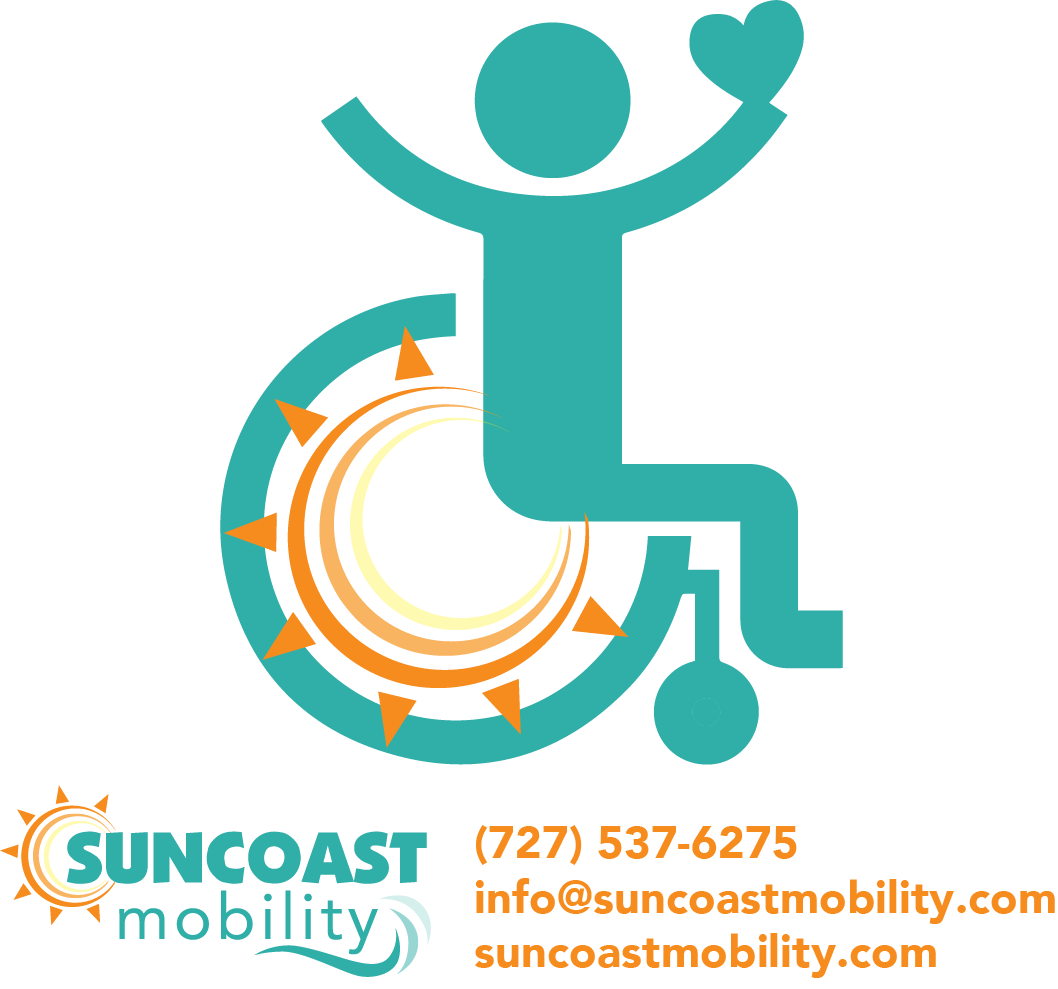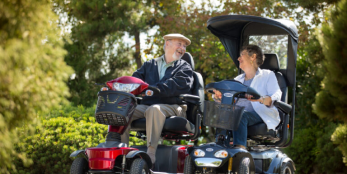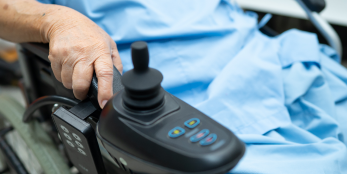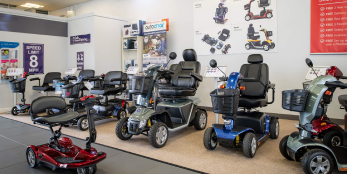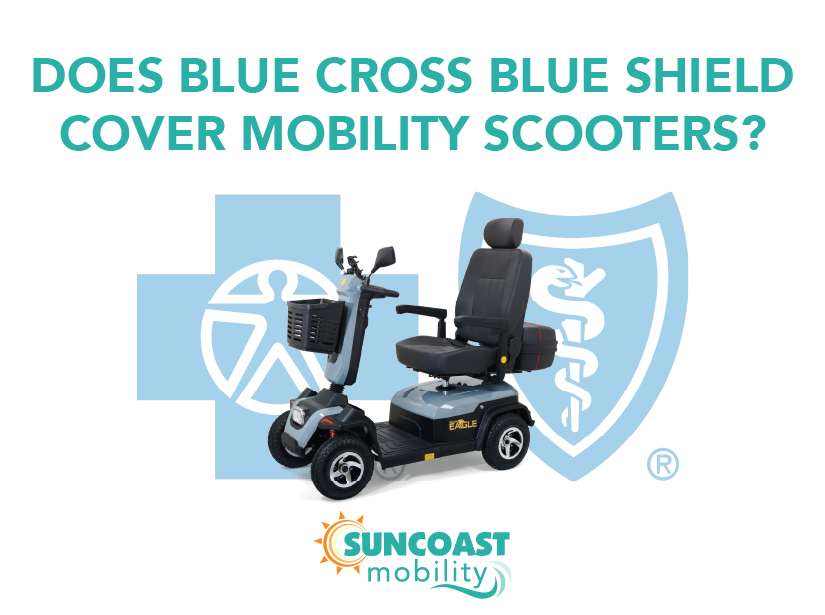Table of contents
Does Blue Cross Blue Shield Cover Mobility Scooters? Complete Guide for 2025
For people who rely on mobility assistance, one of the most common questions is: Does Blue Cross Blue Shield cover mobility scooters? The answer depends on your specific plan, medical necessity, and whether your scooter qualifies as durable medical equipment (DME). Understanding your coverage before making a purchase can save you money, time, and stress.
This complete guide breaks down how Blue Cross Blue Shield (BCBS) handles mobility scooter coverage, what requirements you’ll need to meet, and how to maximize your benefits.
Why Coverage for Mobility Scooters Matters
Mobility scooters are much more than a convenience item—they are often a medical necessity for people living with chronic illnesses, injuries, or disabilities that limit their ability to walk. For many individuals, a scooter provides the freedom to move around the home, run errands, visit family and friends, and stay engaged in the community. By reducing the risk of falls and increasing accessibility, these devices play a direct role in maintaining both safety and independence.
Without a reliable mobility aid, everyday tasks like cooking, bathing, or shopping can become overwhelming or even impossible. That’s why access to a mobility scooter can dramatically improve overall quality of life, helping people stay active and avoid long-term complications that may arise from immobility.
The challenge, however, is cost. Depending on the type, features, and brand, mobility scooters can range from $800 to over $3,500. Lightweight folding scooters, heavy-duty bariatric models, and long-range travel scooters often come at a higher price point. For seniors on fixed incomes or individuals already dealing with high medical expenses, this can make purchasing a scooter out of reach.
That’s where health insurance comes in. Providers like Blue Cross Blue Shield recognize that mobility devices fall under durable medical equipment (DME) and may cover part or all of the cost if the scooter is deemed medically necessary. Understanding your coverage options is crucial because insurance can mean the difference between gaining independence with little out-of-pocket cost—or facing thousands of dollars in expenses.

Does Blue Cross Blue Shield Cover Mobility Scooters?
The short answer is yes—Blue Cross Blue Shield (BCBS) may cover mobility scooters if they are considered medically necessary and prescribed by a qualified healthcare provider. This coverage is designed to help individuals with limited mobility maintain independence and reduce health risks associated with immobility.
In most cases, mobility scooter coverage falls under the category of durable medical equipment (DME) benefits. This means that your plan may pay for all or part of the cost of the scooter, but the exact amount depends on several key factors:
Your specific BCBS plan – Whether you’re enrolled in a Medicare Advantage plan, a private individual plan, or an employer-sponsored plan, benefits and eligibility requirements may vary.
Medical necessity requirements – A doctor must certify that you have a condition that makes it difficult or unsafe to walk long distances without assistance. Typically, insurers require documentation showing that a cane or walker is not sufficient and that a scooter is the most appropriate mobility aid.
In-network DME providers – Most Blue Cross Blue Shield plans require that you purchase your mobility scooter from an approved durable medical equipment supplier in order to qualify for coverage. Using an out-of-network supplier may result in higher out-of-pocket costs or no coverage at all.
Prior authorization – Many BCBS plans require pre-approval before they will cover a scooter. This means your doctor must submit medical records, a prescription, and sometimes a mobility evaluation form to demonstrate your need.
Because Blue Cross Blue Shield coverage for mobility scooters can vary significantly by state, plan type, and provider network, it’s essential to contact your local BCBS office for personalized details. Some states may have more flexible policies, while others require strict documentation before approving coverage.
By confirming the requirements ahead of time, you can avoid unexpected expenses and ensure that your scooter is ordered, delivered, and billed correctly.
When it comes to Blue Cross Blue Shield mobility scooter coverage, the most important factor is medical necessity. Insurance companies, including BCBS, do not view mobility scooters as convenience items—they are only covered when proven to be essential for your health and independence.
Your doctor must provide detailed documentation that shows why a mobility scooter is required instead of other mobility aids such as a cane, walker, or manual wheelchair. This documentation often includes medical records, test results, and notes about your physical limitations.
To meet Blue Cross Blue Shield medical necessity requirements, the following criteria are typically reviewed:
Inability to walk without assistance – You must demonstrate that you cannot move safely around your home using only a cane or walker. If attempting to do so places you at risk of falls or injury, your doctor can justify the need for a scooter.
Daily activity limitations – Your medical condition should make it difficult to perform essential activities of daily living (ADLs) such as cooking, bathing, dressing, or moving between rooms. Insurance approval is more likely when it’s clear that a scooter restores independence.
Safe operation of the scooter – It must be shown that you have the strength, coordination, and cognitive ability to safely operate a mobility scooter. If you cannot control the device on your own, BCBS may instead recommend a power wheelchair with caregiver assistance.
Home accessibility – A mobility scooter must be usable in your home environment. This means your doorways must be wide enough, your hallways accessible, and your living space free from excessive obstacles. If the scooter cannot be reasonably used at home, coverage may be denied.
Without meeting these medical necessity requirements, Blue Cross Blue Shield is unlikely to cover the cost of a mobility scooter. That’s why it’s so important to work closely with your doctor. A detailed prescription and supporting documentation can make the difference between approval and denial.
Pro tip: Ask your doctor to clearly state why a cane, walker, or manual wheelchair is insufficient. This helps establish that the scooter is not just convenient, but medically essential for your daily mobility.
How to Get a Mobility Scooter Through Blue Cross Blue Shield
If you think you qualify, here’s the typical process:
1. Schedule a Doctor’s Visit
Your physician will evaluate your mobility limitations and determine if a scooter is medically necessary.
2. Get a Prescription
If approved, your doctor will write a prescription or Certificate of Medical Necessity (CMN) for a mobility scooter.
3. Submit to Blue Cross Blue Shield
The prescription and medical documentation are submitted to BCBS for review. Some plans require prior authorization before purchase.
4. Work with an In-Network DME Supplier
BCBS usually requires you to purchase or rent the scooter from an in-network DME provider. This ensures coverage applies.
5. Receive Your Scooter
Once approved, you’ll either rent or own the scooter, depending on your plan’s rules.
What Types of Mobility Scooters Are Covered?
Blue Cross Blue Shield typically covers basic mobility scooters designed for indoor use. Coverage for more advanced scooters depends on medical documentation.
Covered: Standard 3-wheel or 4-wheel scooters for daily mobility needs
Sometimes covered: Heavy-duty scooters or travel scooters, if specifically justified
Not covered: Recreational scooters, e-scooters, or devices used primarily outdoors for convenience
Out-of-Pocket Costs for Mobility Scooters
Even if Blue Cross Blue Shield covers your scooter, you may still face out-of-pocket expenses:
Deductible: You must meet your annual deductible before coverage applies.
Coinsurance/Copay: Many plans require a 20% coinsurance payment for DME.
Non-covered features: Upgrades like larger batteries, luxury seating, or portability features may not be covered.
Example: If your scooter costs $1,500 and BCBS covers 80%, you’d pay $300 out of pocket (after deductible).
Blue Cross Blue Shield Medicare Advantage and Mobility Scooters
If you’re enrolled in a Blue Cross Blue Shield Medicare Advantage plan, coverage for mobility scooters may be stronger. Medicare recognizes scooters as DME if:
A doctor certifies medical necessity
The scooter will be used inside the home
You can safely transfer on and off the scooter
With Medicare Advantage, BCBS follows these rules but may offer additional benefits, such as coverage for certain travel scooters or in-home assessments.


Common Challenges and Denials
Not every request for a mobility scooter is approved. Common reasons for denial include:
Lack of medical documentation
Doctor prescribed a wheelchair instead
Requesting a scooter with non-covered features
Home environment not suitable for scooter use
Using an out-of-network supplier
If denied, you can file an appeal with BCBS. Supporting documents from your doctor and therapist can strengthen your case.
Tips to Maximize Your Coverage
If you want Blue Cross Blue Shield to cover your mobility scooter, follow these steps:
✅ Get thorough documentation – Ask your doctor to explain why a cane, walker, or wheelchair won’t work.
✅ Choose in-network suppliers – BCBS often won’t pay for out-of-network purchases.
✅ Request prior authorization – Don’t buy a scooter before getting approval.
✅ Keep copies of everything – Prescriptions, letters, and claim forms may be needed later.
✅ Know your plan benefits – Check your Evidence of Coverage (EOC) document.
Alternative Funding Options If Denied
If your mobility scooter isn’t covered, don’t lose hope. Other options include:
Medicare (Part B) – Covers DME if criteria are met.
Medicaid – May cover scooters for low-income individuals.
Veterans Affairs (VA) – Provides scooters to eligible veterans.
Nonprofit programs – Some charities assist with mobility device funding.
Financing plans – Many suppliers offer monthly payments.
Frequently Asked Questions
Does Blue Cross Blue Shield cover mobility scooters?
Yes, if medically necessary and prescribed by a doctor.
How much will I pay out of pocket?
Depends on your plan’s deductible, copay, and coinsurance. Most people pay around 20% of the cost.
Are travel scooters covered?
Sometimes, but only if your doctor can prove you need portability for daily living.
What if my claim is denied?
You can file an appeal with BCBS and submit additional medical evidence.
Can I buy a scooter online and get reimbursed?
Usually no. BCBS requires you to use an in-network DME provider.
Final Thoughts: Blue Cross Blue Shield Mobility Scooter Coverage in 2025
So, does Blue Cross Blue Shield cover mobility scooters? The answer is yes—but only if you meet the medical necessity requirements and follow the proper approval process. BCBS, like most insurers, views scooters as durable medical equipment (DME), meaning they are covered only when they are essential to your health, safety, and independence.
The key takeaway is preparation. To improve your chances of approval, you’ll need:
A detailed doctor’s prescription and medical documentation
Proof that a cane, walker, or manual wheelchair isn’t sufficient
Compliance with prior authorization and in-network provider rules
A home environment that can safely accommodate a scooter
By taking these steps, you not only increase the likelihood of coverage but also reduce the risk of unexpected out-of-pocket costs. Even with approval, remember that deductibles, coinsurance, and non-covered features (like larger batteries or premium seating) may still be your responsibility.
If your claim is denied, it’s important not to give up. Appeals, additional documentation, and even alternative funding sources such as Medicare Advantage, Medicaid, Veterans Affairs (VA), or nonprofit organizations can help bridge the gap and get you the mobility support you need. Many individuals also turn to financing programs or charitable foundations that provide assistance with mobility devices.
At the end of the day, Blue Cross Blue Shield mobility scooter coverage can be a game-changer for individuals facing mobility challenges. These devices restore independence, reduce fall risks, and allow you to remain active in your home and community. Understanding how BCBS evaluates claims, preparing your medical records in advance, and working with the right providers can make the process smoother and more successful.
With the right preparation, you can confidently navigate the system and secure a mobility scooter that enhances your freedom, safety, and quality of life in 2025 and beyond.
